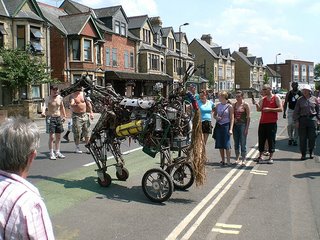"Like the four horsemen of the apocalypse, war, terrorism, crime and disaster are driving the development and deployment of fresh armies of robots."I would just like to add to that, "And the horses will be robotic!"

I would also like to offer this article as a response to Bruce Deitrick Price who claims that the complex interplay of systems required to produce a Turing test passing robot will take greater than 20-50 years. I counter his argument with the fact that the cooperation between teams of researchers around the globe has been growing at an explosive rate. This is driven not only by the motivators in the McClatchy story but also through corporate sponsored competition and Internet driven information sharing.
Price also goes on to discount the idea that robots will ever become more than "fake flowers that seemed more real than real flowers" when compared to humanity. As a technology watcher myself, it seems that he's missing a big chunk of the picture. First, this view of the future assumes that biotechnology will never fully understand the ontology of human consciousness. This is the only scenario that would lead to computers that are never able to "be human." As it turns out even this weighty topic is gaining momentum in the annals of academia. While that topic is a difficult one, the reverse engineering of the human brain is not. This area of research is spanned by many fields. From psychology and neuroscience to congnitive studies and AI research, as each system is mapped an expert system will be there to simulate it.
The second striking thing that Price neglects is the exponential growth of computing power. As Moore's law progresses closer and closer to the point where the theoretic computing power of a human brain is available in a desktop computer, robot brains will have no problem navigating the jungles of our daily world. Not only will they have our cognitive abilities, but if they carry forward the strengths of today's computers they won't have the ramp-up time our children need to learn all those skills. The robots will just be able to download the skills from their last generation.
Frankly this view of defeatism for robotics looks at the last 30 years of progress, somehow without looking at the last 5. The rate of innovation is increasing. The robots will catch up to us within the next 20 years, not the next 50, and if we're not calling out from the hilltops and holding the roboticists of today accountable, then our species will be in danger of a great deal more than just feeling uneasy.


2 comments:
It's wonderful to be debated seriously by someone in the field. 20 years, huh? I hope we are all here to check out that prediction, which I think will fail. Let me just say that the thrust of my comments is not that AI people aren't super-smart and making great advances. They are; they are. The thrust is that EVERYTHING human is more complex than we like to think. Consciousness?? Maybe in 20 years we'll have an expert robot tennis player. But I wouldn't expect it to be conscious.
It's wonderful to be debated seriously by someone in the field. 20 years, huh? I hope we are all here to check out that prediction, which I think will fail. Let me just say that the thrust of my comments is not that AI people aren't super-smart and making great advances. They are; they are. The thrust is that EVERYTHING human is more complex than we like to think. Consciousness?? Maybe in 20 years we'll have an expert robot tennis player. But I wouldn't expect it to be conscious.
Post a Comment